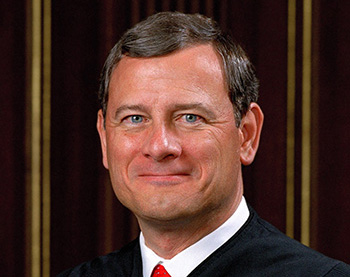Chief Justice Roberts tasks judiciary with addressing three areas in year-end report

Chief Justice John G. Roberts Jr.
In an annual report released Friday, Chief Justice John G. Roberts Jr. said the Judicial Conference of the United States will address three areas “that have been flagged by Congress and the press over the past year” but doesn't need any help from legislators.
“The judiciary’s power to manage its internal affairs insulates courts from inappropriate political influence and is crucial to preserving public trust in its work as a separate and coequal branch of government,” Roberts wrote in his 2021 Year-End Report on the Federal Judiciary.
The Washington Post, the New York Times and Reuters have coverage.
Roberts focused first on financial disclosure and recusal obligations, pointing to a recent investigation by the Wall Street Journal that revealed 131 federal judges participated in as many as 685 matters involving companies that they or their family members owned stock in from 2010 through 2018.
“Let me be crystal clear: the judiciary takes this matter seriously. We expect judges to adhere to the highest standards, and those judges violated an ethics rule,” Roberts said, referring to the federal statute that requires judges to recuse themselves in all matters that involve personal financial interests.
To combat these problems, Roberts said the Administrative Office of the U.S. Courts is partnering with several of the Judicial Conference’s committees to improve automated detection of potential conflicts in case management software. They are also working to overhaul ethics courses to help make judges aware of their obligations and understand how to properly identify conflicts.
While Roberts listed “the continuing concern over inappropriate behavior in the judicial workplace” as the second area, he contended that the Federal Judiciary Workplace Conduct Working Group found in 2018 that misconduct is not pervasive among judges. However, the group made more than 20 recommendations, including that the judiciary revise its codes of conduct, strengthen its process for identifying and addressing misconduct, and expand its training related to conduct.
The Judicial Conference adopted these recommendations in 2019, Roberts said.
“The Judicial Conference, with the assistance of the administrative office and the working group, will continue to oversee reform efforts to ensure they achieve the objective we all seek,” he wrote. “I appreciate that members of Congress have expressed ongoing concerns on this important matter, and the Judicial Conference and its committees remain fully engaged.”
Roberts said the third area of focus is “an arcane but important matter”: how venue is chosen for patent cases.
Reuters reports that in November, senators from both parties voiced concerns that nearly 25% of all U.S. patent litigation is pending before the federal court in Waco, Texas. In a letter to Roberts, the senators contended that plaintiffs who sue in the U.S. District Court for the Western District of Texas can request to have their cases heard in a specific division.
Roberts acknowledged that case assignment procedures “might, in effect, enable the plaintiff to select a particular judge to hear a case” and said he has asked the Judicial Conference to examine the issue.
“This issue of judicial administration provides another good example of a matter that self-governing bodies of judges from the front lines are in the best position to study and solve—and to work in partnership with Congress in the event change in the law is necessary,” Roberts wrote.
As is customary, Roberts also shared in his year-end report stories of William Howard Taft, who served first as U.S. president and then as chief justice a century ago. He said Taft recognized the need for the judiciary to remain independent and manage its own affairs, even in the face of criticism, citing comments that Taft made while he was president of the ABA.
“The Congress of his era appreciated the judiciary’s need for independence in our system of separate and co-equal branches, and it provided a sound structure for self-governance,” Roberts wrote. “Since that time, the Judicial Conference has been an enduring success. It is up to the task of addressing the three topics I have highlighted, as well as the many other issues on its agenda.”



